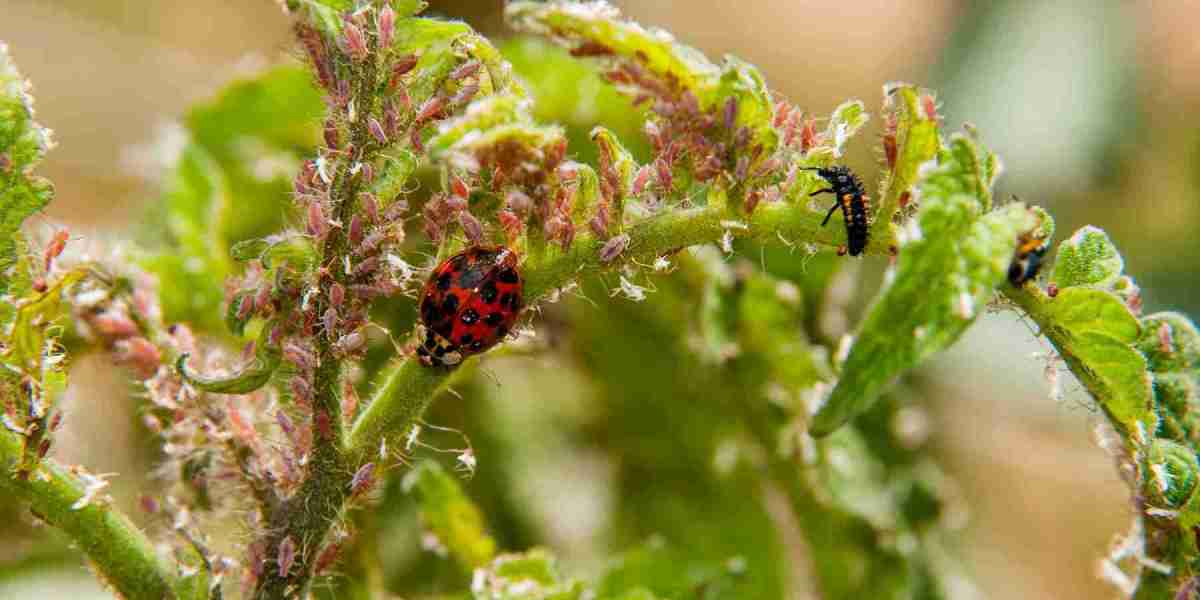The biocontrol agents market is rapidly gaining attention as the agricultural sector moves toward more sustainable practices. Biocontrol agents, which include beneficial insects, microorganisms, and natural compounds, provide an environmentally friendly alternative to chemical pesticides. As concerns about the environmental and health risks associated with synthetic pesticides grow, biocontrol agents are becoming a viable solution for pest management in agriculture. This article delves into the potential of the biocontrol agents market, exploring key growth drivers and opportunities that are expected to shape its future.
1. Shift Toward Sustainable Agriculture
One of the main factors driving the biocontrol agents market potential is the growing global shift toward sustainable agriculture. With the increasing demand for food production to support a growing population, it is becoming increasingly clear that conventional chemical pest control methods are unsustainable in the long run. These methods are often harmful to the environment, polluting water supplies and harming non-target organisms, including beneficial insects like bees.
Sustainable agriculture focuses on promoting environmental health, biodiversity, and long-term soil fertility. Biocontrol agents are an essential part of this shift. By using natural pest control methods, such as beneficial insects, fungi, and bacteria, farmers can minimize their reliance on chemical pesticides while maintaining healthy crop yields. This growing preference for organic and sustainable farming methods presents significant opportunities for biocontrol agents in the agricultural sector.
2. Regulatory Pressures and Support
Governments worldwide are tightening regulations on the use of chemical pesticides, which further boosts the potential of the biocontrol agents market. In the European Union, for example, initiatives like the Farm to Fork Strategy and Green Deal are pushing for a reduction in pesticide use. The EU aims to reduce pesticide use by 50% by 2030, which opens the door for biocontrol agents to take center stage as safer alternatives.
In the United States, the Environmental Protection Agency (EPA) is also increasingly regulating pesticide use and promoting alternatives like biocontrol methods. Additionally, many governments are providing financial incentives and subsidies to encourage the adoption of sustainable pest management practices, further driving the demand for biocontrol agents.
The regulatory landscape is becoming more supportive of biocontrol agents, and as governments tighten pesticide restrictions, the market is expected to experience accelerated growth. This regulatory push, along with consumer demand for pesticide-free food, is shaping the future potential of the biocontrol agents market.
3. Economic Benefits and Cost-Effectiveness
Another key driver of the biocontrol agents market potential is the economic benefits they offer to farmers. While the initial investment in biocontrol agents may be higher than chemical pesticides, they often lead to significant long-term cost savings. Biocontrol agents are often more targeted and effective in controlling specific pests, reducing the need for repeated pesticide applications. This can result in lower overall costs for pest management in the long run.
Furthermore, biocontrol agents are less likely to harm beneficial organisms, such as pollinators and natural predators, which can further reduce crop losses. This enables farmers to maintain a more balanced and resilient agricultural ecosystem. By adopting biocontrol agents, farmers can achieve higher yields with fewer inputs, contributing to the overall profitability of their operations.
4. Consumer Demand for Organic Products
The growing consumer preference for organic products is another factor that is driving the biocontrol agents market potential. Consumers are increasingly aware of the negative impacts of synthetic pesticides on their health and the environment. As a result, there is a rising demand for food products that are grown without the use of harmful chemicals.
Biocontrol agents are essential in organic farming systems, where synthetic pesticides are prohibited. The ability to use natural pest control methods to protect crops is a key reason why organic farming is growing at a rapid pace. This surge in demand for organic products is creating significant opportunities for biocontrol agents, as more farmers turn to sustainable pest management solutions to meet consumer expectations.
As the organic food market continues to expand, the biocontrol agents market is expected to see a parallel increase in demand, providing ample growth opportunities for companies offering biological pest control solutions.
5. Technological Advancements and Innovation
Technological advancements are further enhancing the potential of the biocontrol agents market. Innovations in biotechnology are enabling the development of more effective and stable biocontrol agents. For example, researchers are working on genetically modified organisms (GMOs) that are designed to target specific pests with greater precision, reducing the need for broad-spectrum pesticides.
Additionally, precision agriculture technologies, such as drones, sensors, and artificial intelligence (AI), are enabling farmers to monitor pest populations in real time and apply biocontrol agents more effectively. These technologies ensure that biocontrol agents are used precisely when and where they are needed, improving efficiency and reducing waste.
As the use of precision agriculture techniques grows, the market potential for biocontrol agents will continue to expand, creating new opportunities for both producers and users of biocontrol solutions.
6. Expansion in Emerging Markets
The biocontrol agents market potential is not limited to developed regions such as Europe and North America. Emerging markets in Asia-Pacific, Latin America, and Africa present significant growth opportunities for biocontrol agents. These regions are increasingly facing challenges related to food security, pest resistance, and environmental degradation, making sustainable agricultural practices more critical.
In countries like India, China, and Brazil, there is growing awareness of the need for sustainable pest control methods. Governments in these regions are starting to recognize the importance of biological control solutions, and agricultural policies are beginning to shift toward promoting sustainable pest management practices. This creates ample opportunities for biocontrol agents in emerging markets, where adoption rates are expected to rise in the coming years.
Additionally, smallholder farmers in regions such as Africa are turning to biocontrol agents to improve crop yields while reducing pesticide use. As awareness grows and access to biocontrol solutions increases, the market potential in these regions will continue to grow.
7. Challenges and Barriers to Growth
Despite the promising outlook, the biocontrol agents market faces certain challenges that could hinder its growth potential. One of the primary barriers is the lack of awareness and education among farmers, particularly in developing countries. Many farmers are not familiar with the benefits of biocontrol agents or may be hesitant to switch from traditional pest control methods.
Another challenge is the relatively high cost of some biocontrol agents compared to chemical alternatives. While biocontrol agents offer long-term cost savings, the upfront investment can be a deterrent for farmers, especially those operating on tight budgets.
To overcome these challenges, there is a need for increased education and outreach to farmers, as well as financial incentives and subsidies that can make biocontrol agents more affordable and accessible.
Conclusion
The biocontrol agents market potential is vast, driven by the growing demand for sustainable agriculture, regulatory support, consumer preferences for organic products, and technological advancements. As awareness of the environmental and health benefits of biocontrol agents increases, the market is expected to continue its upward trajectory. Emerging markets in Asia-Pacific, Latin America, and Africa present significant growth opportunities, while advancements in precision agriculture and biotechnology will further enhance the effectiveness and reach of biocontrol agents. Despite challenges, the future of the biocontrol agents market looks promising, offering significant potential for both established companies and new entrants in the industry.




